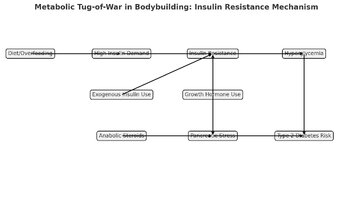The reason some bodybuilders develop diabetes isn’t random bad luck; it’s a consequence of repeatedly stressing the body’s finely tuned insulin-glucose system in the pursuit of extreme muscle mass and leanness.
Insulin Resistance from Chronic Overfeeding
Building muscle requires a caloric surplus and frequent carbohydrate loading. When someone constantly consumes large amounts of carbs, especially simple ones (like dextrose or high-GI foods used post-workout), their pancreas has to crank out more insulin to keep blood glucose in check.
Over time, muscle, liver, and fat cells become less responsive to insulin this is called insulin resistance, a precursor to type 2 diabetes. The body’s message becomes, “I’m tired of listening to your insulin signals,” and glucose starts to build up in the bloodstream. Eventually, the pancreas can’t keep up, and blood sugar control starts to slip.
Insulin Misuse (Exogenous Insulin Use)
Some advanced bodybuilders inject insulin to drive more nutrients especially glucose and amino acids into muscle cells for growth. Be aware that this is playing with a biochemical flamethrower.
Mismanaging injected insulin can cause:
* Hypoglycemia (blood sugar crash) if carbs aren’t perfectly timed
* Chronic insulin overstimulation, which blunts natural insulin sensitivity over time
* Pancreatic down-regulation, where the body’s natural insulin production declines
Repeated cycles of high-dose insulin plus heavy carb intake mimic the early pathology of metabolic syndrome.
Growth Hormone (GH) and IGF-1
Growth hormone often stacked with insulin and anabolic steroids antagonizes insulin. GH increases fat breakdown but also raises blood glucose levels by decreasing insulin’s effectiveness in tissues.
When combined with insulin use, this tug-of-war creates long term insulin resistance. GH basically says, “Let’s burn fat,” while insulin says, “Let’s store energy.” The pancreas ends up confused and overworked.
Anabolic Steroids and Beta-Cell Dysfunction
Some anabolic steroids (especially 17-alpha-alkylated oral compounds like Winstrol or Dianabol) cause oxidative stress and inflammation in the pancreas the very organ that makes insulin.
Over time, this can impair the beta cells’ ability to secrete insulin efficiently. Combine that with insulin resistance, and you’ve got a perfect storm leading to diabetes-like metabolic dysfunction.
Extreme Cutting and Rebound
During contest prep, many bodybuilders go through aggressive carb depletion followed by carb loading. These cycles can mess with glucose transporters (GLUT-4) in muscle cells and reduce metabolic flexibility the ability to switch between burning carbs and fats.
Repeated extreme dieting phases can lead to long-term hormonal dysregulation, including impaired insulin signaling.
Genetic Susceptibility + Lifestyle Acceleration
Some athletes have genetic tendencies toward type 2 diabetes or metabolic syndrome. The intense cycles of bulking, cutting, and drug use don’t cause diabetes from scratch they just accelerate a process that might have taken decades.
To sum this up… Bodybuilders don’t develop diabetes because of training, they develop it from metabolic overclocking.
Between massive food intake, hormone manipulation, insulin injections, and stress on the pancreas, the body’s natural glucose control system gets pushed to its limits.

Here It shows how diet, drugs, and hormones pull on the body’s metabolic system from different angles until insulin resistance and eventually diabetes can emerge.
The flow follows the path from overfeeding and exogenous hormone use down to pancreatic stress and chronic hyperglycemia. Insulin resistance sits at the crossroads of everything, dietary overload, growth hormone antagonism, and anabolic steroid effects.
That’s the metabolic bottleneck where most lifters/bodybuilders get into trouble
Insulin Resistance from Chronic Overfeeding
Building muscle requires a caloric surplus and frequent carbohydrate loading. When someone constantly consumes large amounts of carbs, especially simple ones (like dextrose or high-GI foods used post-workout), their pancreas has to crank out more insulin to keep blood glucose in check.
Over time, muscle, liver, and fat cells become less responsive to insulin this is called insulin resistance, a precursor to type 2 diabetes. The body’s message becomes, “I’m tired of listening to your insulin signals,” and glucose starts to build up in the bloodstream. Eventually, the pancreas can’t keep up, and blood sugar control starts to slip.
Insulin Misuse (Exogenous Insulin Use)
Some advanced bodybuilders inject insulin to drive more nutrients especially glucose and amino acids into muscle cells for growth. Be aware that this is playing with a biochemical flamethrower.
Mismanaging injected insulin can cause:
* Hypoglycemia (blood sugar crash) if carbs aren’t perfectly timed
* Chronic insulin overstimulation, which blunts natural insulin sensitivity over time
* Pancreatic down-regulation, where the body’s natural insulin production declines
Repeated cycles of high-dose insulin plus heavy carb intake mimic the early pathology of metabolic syndrome.
Growth Hormone (GH) and IGF-1
Growth hormone often stacked with insulin and anabolic steroids antagonizes insulin. GH increases fat breakdown but also raises blood glucose levels by decreasing insulin’s effectiveness in tissues.
When combined with insulin use, this tug-of-war creates long term insulin resistance. GH basically says, “Let’s burn fat,” while insulin says, “Let’s store energy.” The pancreas ends up confused and overworked.
Anabolic Steroids and Beta-Cell Dysfunction
Some anabolic steroids (especially 17-alpha-alkylated oral compounds like Winstrol or Dianabol) cause oxidative stress and inflammation in the pancreas the very organ that makes insulin.
Over time, this can impair the beta cells’ ability to secrete insulin efficiently. Combine that with insulin resistance, and you’ve got a perfect storm leading to diabetes-like metabolic dysfunction.
Extreme Cutting and Rebound
During contest prep, many bodybuilders go through aggressive carb depletion followed by carb loading. These cycles can mess with glucose transporters (GLUT-4) in muscle cells and reduce metabolic flexibility the ability to switch between burning carbs and fats.
Repeated extreme dieting phases can lead to long-term hormonal dysregulation, including impaired insulin signaling.
Genetic Susceptibility + Lifestyle Acceleration
Some athletes have genetic tendencies toward type 2 diabetes or metabolic syndrome. The intense cycles of bulking, cutting, and drug use don’t cause diabetes from scratch they just accelerate a process that might have taken decades.
To sum this up… Bodybuilders don’t develop diabetes because of training, they develop it from metabolic overclocking.
Between massive food intake, hormone manipulation, insulin injections, and stress on the pancreas, the body’s natural glucose control system gets pushed to its limits.

Here It shows how diet, drugs, and hormones pull on the body’s metabolic system from different angles until insulin resistance and eventually diabetes can emerge.
The flow follows the path from overfeeding and exogenous hormone use down to pancreatic stress and chronic hyperglycemia. Insulin resistance sits at the crossroads of everything, dietary overload, growth hormone antagonism, and anabolic steroid effects.
That’s the metabolic bottleneck where most lifters/bodybuilders get into trouble



